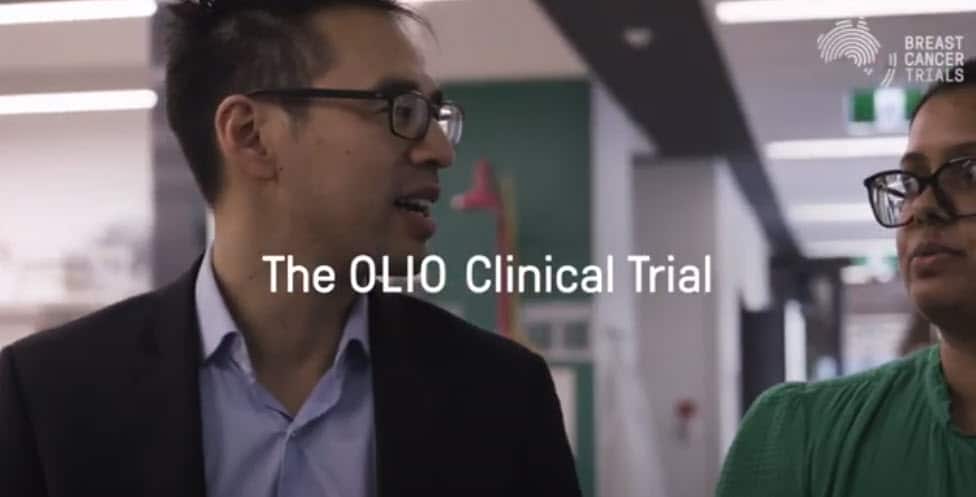- Research
- 2022-2026 Research Strategy
- Open Clinical Trials
- Closed Clinical Trials
- What is a Clinical Trial?
- Why Participate in a Clinical Trial
- Remote Telehealth Pre-Screening Process
- Research Achievements
- Publications
- Research Development and Funding
- Participating Institutions
- International Collaboration
- BCT Trials & Projects Summary
- Translational Research
- Clinical Fellowship Program
- International Fellowship Support
- Annual Scientific Meeting
- Travel Grants and Awards
- About
- Our Impact
- Fundraise
- Donate
- Researcher Login
- Cart
The OLIO Clinical Trial
HR-positive breast cancer is the most common type (70%) of breast cancer. It is effectively treated by hormone treatment after surgery; patients may also have chemotherapy before or after surgery. However, this treatment seems to be less effective in younger (pre-menopausal) women and the cancer is more likely to come back. Researchers are still trying to work out why this happens, but it is possible that HRD-positive tumour cells could be one reason.
“HRD-positive” (homologous recombination deficiency) means that there is a defect in the way that tumour cells repair themselves. This defect could make the cancer more sensitive to treatment with olaparib or olaparib + durvalumab.
Olaparib is a type of drug called a “PARP inhibitor”. It harms cancer cells by blocking their DNA repair process through the PARP pathway. This means that the cancer cells may be less able to repair damage. Olaparib is more likely to kill tumour cells when they are HRD-positive.
Durvalumab is a type of drug called an “immune checkpoint inhibitor”. Sometimes cancer cells and immune cells can send out signals to stop the body’s immune system from controlling the cancer. Durvalumab works to block these signals and increase the immune response, helping the body’s immune system to fight the cancer.
Olaparib blocks DNA repair, which may also increase the body’s immune response.
The purpose of OLIO is to find out if adding the medicines olaparib, or olaparib with durvalumab together, to standard chemotherapy given to premenopausal women with HR-positive, HER2-negative, HRD-positive breast cancer before surgery will do a better job of treating the cancer.
It is hoped this research will provide new treatment options for young women with HR-positive, HER2-negative breast cancer, particularly among those selected for a high HRD score.
The OLIO clinical trial will involve 21 sites in Australia and will enrol 56 patients in the study.
BCT is trialing a remote telehealth pre-screening process to broaden clinical trials access to regional and remote patients and improve clinical trial recruitment. Click here for further information.
Dr Stephen Luen is the Study Chair for the OLIO clinical trial.





